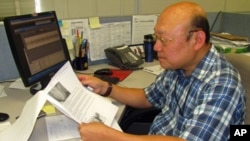North Korea has one of the world's most secretive governments, which masks the reality of its economic and political affairs from both outsiders and its own citizens. Determining the Communist state's plans is much like reading tea leaves in a cup. And with Pyongyang's announcement of the first ruling party conference in 30 years, observers are now scrambling to learn more.
Broadcasters with the Voice of America's Korean service take turns reading the news into a pair of microphones in a studio in Washington, D.C. Their director guides them through the program headed to North Korea, where authorities frequently try to jam the signal. But getting the news into North Korea is not nearly as difficult as getting it out.
To listen to Kate Woodsome's complete report, click here:
In the team's newsroom, senior reporter Won-Ki Choi squints at North Korean Web sites and photos of leader Kim Jong Il. As he turns to a news report about a recent typhoon, he says insightful clues can come from closely reading state media.
"This is what we call KCNA. North Korean official news agency. But the problem is that there's no real news at all," says Choi. "But if you read it carefully, this is just the story about the Typhoon Number 7, Kompasu. The interesting thing is that usually they do not report how many people were killed. Never."
For this month's typhoon, he says North Korean media took the rare step of broadcasting death tolls from a natural disaster.
"It means because of the flood, wind and the landslide, dozens of people were killed. For the first time they said that," Choi says.
He adds the unusual details would catch the notice of North Koreans. But determining exactly why state media wanted to catch their attention is more difficult.
Ruling party meeting
Choi thinks it could be linked to the upcoming ruling Workers' Party conference. The meeting was initially scheduled for the first half of September, but the date later passed without mention in state media. Choi says the typhoon report could be a way of subtly addressing the issue.
"So they should explain a little bit about that for their own people or outside. So my interpretation is that maybe some local people, local representative of Korean Workers' Party has not come to Pyongyang," says Choi.
It is a guess. Pure speculation. It is called "Pyongyangology." The last surviving offshoot of Kremlinology, the art of studying the Soviet Union's opaque central government during the Cold War.
Fact or fiction
The most important skill of a Pyongyangologist is the endurance to slog through mountains of propaganda, says Charles Armstrong, the director of the Center for Korean Research at New York's Columbia University.
"The language of North Korean media is very repetitive and full of clichés. But nevertheless if you know how to read them correctly, you can find interesting tidbits amongst all of these repetitive statements. You just have to know which ones to pay attention to," says Armstrong.
Clues are also found in photos and songs such as "Footsteps," a tune that has been blaring across the country for the past year, extolling the virtues of Kim Jong Un, the youngest son of Kim Jong Il.
Declaring that "Commander Kim is stepping forward," it is considered a succession anthem for the apparent heir to the world's only Communist dynasty.
Computer numeric control
North Korea is also priming the public for the change with the catchphrase "Computer Numeric Control," or "CNC," a slogan now familiar in news reports and propaganda posters, says Columbia University's Armstrong.
"This seems to be a way of creating a language that would legitimize Kim Jong Un as the leader of the new generation that's more technologically savvy and taking North Korea rather belatedly into the 21st century."
The messaging campaign appears to be working, according to Paul Estabrooks, Senior Communications Specialist for the Christian advocacy group Open Doors International, who visited Pyongyang last month with a tour group from China.
Changing titles
"Historically, Kim Il Sung, the founder, was always called the 'Great Leader.' And his son, Kim Jong Il, who is today's leader, was called the 'Dear Leader,'" notes Estabrooks, adding that the nomenclature has changed.
He says Kim Il Sung was only referred to as "President" or "Eternal President" during his trip, and that Kim Jong Il was always referred to as the “Great Leader,” a term previously reserved for his father.
"And never did we hear last month [Kim Jong Il ] as the term 'Dear Leader.' And I believe it's because they're saving that term now for the next generation, for Kim Jong Il's son," Estabrooks says.
North Korea's state-run news agency has announced a new date for the Workers' Party conference: September 28.
Until then, back in Washington, VOA's Korean service is pouring through more North Korean propaganda, trying to sort fact from fiction.




